Arthritis
Acupuncture Post-NYC Marathon
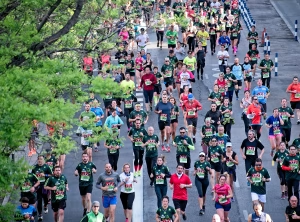
The NYC marathon was this past weekend, and approximately 55,000 people pursued an admirable goal, reached a self-defined mountaintop, and in the process may have caused some degree of irreparable damage to their knees and/or hearts.
Although running is not the most advisable form of exercise in Chinese medicine, it is my opinion that for most people in moderation its benefits outweigh its pitfalls, helping to improve stamina and cardiovascular health, promote circulation, and in most months out of the year a healthy, non-excessive amount of perspiration.
But just like too much perspiration ends up negating its benefit by leaching the anti-inflammatory molecules and neurotransmitters contained within it, too much running can cause more harm than good—excess sweat being just one form of it.
While I struggle to disidentify as anything but a metropolitan, I also know that humans were not intended to walk, let alone run, on cement. That concrete is an inorganic, manmade endeavor, a luxury but challenge of modern society—good for capitalism, bad for Daoism.
Repeated pounding on the knees depletes their synovial fluid, the cushioning between bones and lubrication around tendons and ligaments that keep them soft, pliable, protected. Two ways to mitigate this effect is through stretching, that is opening the vessels and collaterals that send fluids to the patellae, but also with treatment.
Local acupuncture where fluid is missing cannot offer very much, but local moxibustion can inhibit NF-kappa B (inflammatory) signaling pathways, thereby dilating local vessels enough to attract white blood cells and healthy fluids. What’s more, “sports medicine” treatment around the neuromuscular paths that surround the knees can have a similar effect. Rectus femoris, biceps femoris, vastus medialis and laterali—basically, invigorate the thighs to unburden the bones.
As for the heart, this is obviously a serious issue. Excess exercise is arguably just as hard on the body as no exercise. It is important that we all find our own unique sweet spot in the middle and engage with discipline each week. For the excess inflammatory type, who drips with sweat, whose face turns red during workouts, who over-indulges and over-extends, the best recovery formula after a marathon will likely be Bai Hu Jia Ren Shen Tang, or White Tiger and Ginseng Decoction, with gypsum stone to clear the inflammatory heat that can overstimulate the heart, plus ginseng, licorice, and that’s right, white rice, to prevent further heat from flaring.
For the more typical runner type, thin and pale, who gets easily cold and prone to getting sick or injured, a potential recovery formula is Gui Zhi jia Gui Tang, or Cinnamon Twig Decoction with licorice, ginger, red dates, and extra cinnamon to strengthen and warm the chest.
Wishing everyone a speedy recovery, whether from the madness of marathon running or that of trick-or-treating. Stay warm and take care, especially en route to the holidays!
Heel Pain & Autumn Equinox
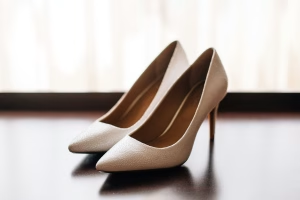 I recently experienced mild heel pain around the center and edges of my right heel, if not for the first time ever, surely the first in a long time. While one night watching TV last week, I simply needled the “heel point,” located in the center of the base of the palm, just distal from the wrist crease—not one of the body’s more forgiving, gentle points, but tolerable. While the point was in, I rotated my foot and even massaged the heel a bit with my other hand. The next day it was better.
I recently experienced mild heel pain around the center and edges of my right heel, if not for the first time ever, surely the first in a long time. While one night watching TV last week, I simply needled the “heel point,” located in the center of the base of the palm, just distal from the wrist crease—not one of the body’s more forgiving, gentle points, but tolerable. While the point was in, I rotated my foot and even massaged the heel a bit with my other hand. The next day it was better.
Why needle the hand? And how did this happen, beyond just the lazy etiological platitude of “getting older?”
We are embarking into autumn, the season ruled by the lungs and large intestine. The function of these wonderful organs is to distribute substances downward, quite obviously in the case of the latter, but we also think of the lungs’ function as down bearing, depurative, in distribution of gases and fluids to the lower region of the body—hormonal reserves and essential fluids.
This is why ancient Chinese called the lungs “mother” to the kidneys—the former “engenders” the latter by way of this mechanism of distribution. “Engenderment” in this case might be understood as adrenal and hormonal health’s reliance on ample distribution of fluids and gases from the upper regions of the body. This is why it is important, in my opinion, to consider daily yoga or qi gong routines before resorting to hormone replacement.
What’s more, many of us have also had the experience of having a morning bowel movement on the heels—no pun intended—of morning breathing exercises or yoga, underscoring the inseparable connection between the lungs and intestines along the gut-lung axis.
“The heel point” is not magical. The heels are where the kidney and urinary bladder vessels begin and end respectively, surely highlighting how overworked I may have been, as well as admittedly my own progress along the aging process. When we have heel pain, there is a good chance the lungs are not pulling their weight insofar as distributing anti-inflammatory substances to the bottom of the body. Located at the base of the palm, the point is just lateral to acupuncture’s lung vessel. It acts as a mirror to the heel, not just because of cute bodily holograms, but because the kidneys rely on their mother for circulation.
This “mother son” relationship exists between all our organs and structural parts. For example, pain in the groin exists along the liver vessel, whose mother is the kidneys, which reside in the lower back adjacent to the lumbar vertebrae that innervate the groin! Pain in the knees usually exists along the stomach or pancreatic vessel whose mother is the heart, another organ whose primary function is to distribute blood downward—and the knees can be a long way to travel.
If you or a loved one experiences pain, it’s great to understand it from a musculoskeletal perspective and take care orthopedically, but if you are interested in its root cause, why it happened to land in that place on your body instead of elsewhere, please reach out!
Throwing my Back Out! And Self-Treatment
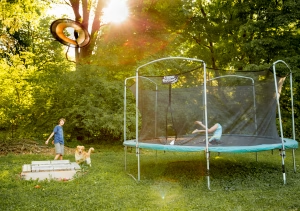 I’ve arrived, folks. I’ve made it! I am finally “threw-my-back-out-doing-nothing” years old.
I’ve arrived, folks. I’ve made it! I am finally “threw-my-back-out-doing-nothing” years old.
One morning last week, I was doing my Qi Gong practice, followed by stretching. I got up off the floor, and I felt my familiar old friend—my right sacroiliac joint—a sprain-like, nerve sensation coupled with soreness, say hello for the first time in years.
In fairness, the stage had been set leading up to this relatively non-expenditure of motion. I’d spent the week before doing an inordinate amount of housework, hosting family staying with us, much more cooking and cleaning, a bit more indulging, not to mention a home’s worth of laundry after my daughter’s Lice sequel, so my body was spent. On the day before I jumped as high as I could on our trampoline and wrestled maniacally with 4-year-olds.
I spent the next morning in pain, obsessively trying to stretch, but to no avail. It was apparently too inflamed, needed first to set in before it could heal, the way it is difficult to resolve a virus in its first 12 hours—that is before it shows itself for what kind of virus it is. By afternoon I could barely walk (unfortunately in parenthood rest is rarely an option). I surely couldn’t lift anything, and wondered if I’d make it to work the next day!
- SIMPLICITY & REPETITION: I decided to minimize, to consolidate my rehabilitative routine to just a few reliable stretches, which is important in my opinion, then did them constantly. Some physical therapists make the mistake of assigning 8 or 9 daily exercises, most of which might be beneficial, but if one or two are potentially aggravating, they might keep people on the hamster wheel of suffering, not realizing they could be doing less and getting better.
- HERBS: Once in a while we are forced off of our soap boxes and bow in humility in front of that which we resist. I prescribed myself a non-holistic formula—not individualized to my unique pattern—but one simply for inflammation in the low back and lower body. Well worth it short-term, though in fact I did suffer a side effect as a result. While excitatory/warm-natured eucommia bark probably helped my back, it did impact my quality of sleep that night. I cooked it in conjunction with pearl barley, phellodendron bark, and other blood movers to promote circulation in the lower portion of the body, then drank it while my wife warmed up a heating pad for me.
- HEAT: As we say in Chinese medicine: “Ice is for dead people”—dead bodies to be exact, but most injuries are not ones of inflammation to the degree of compartment syndrome, which merits ice. Most are minor, protective inflammations surrounded by tight, hypertonic muscles and ligaments that need relaxation, which heat provides.
- ACUPUNCTURE: While lying atop my heating pad, I obviously could not needle my own lower back, but I could use “distal points” that connect the spine, ligaments, and erector spinae muscles. I used “Small Intestine 3,” located next to the pinky joint, to treat the spine, “Spirit Bone,” located at the junction of the first and second metacarpals, for its endogenous opioid-releasing effects and connection with the low back’s complementary (lung) vessel; finally “Triple Warmer 9,” atop the forearm near the elbow, also to send blood to its paired vessel. I left the needles in for thirty minutes, basically the duration of a TV show we watched (Wednesday—not thus far recommending), and when I got up to go to bed I was about 25% better. When I woke up the next morning I was 75% better, still having not taken one single, solitary NSAID. No judgement for those that need painkillers, but in my opinion, their side effects should be respected enough to reserve them for times of actual need—pain in times when we need to be active, as opposed to discomfort in times where we can relax.
I should continue to get acupuncture from someone else for this as well. Also, I must do my daily stretches, gradually incorporating more every few days, and probably call it a year on my trampoline wrestling career. I share this story not to brag—though it’s nice to brag—but to reiterate the value of constant and appropriate physical movement and attention towards our ailments. I went from being unable to walk to a full commute and pain-free workday overnight!
Slow & Steady Heals the Shoulder
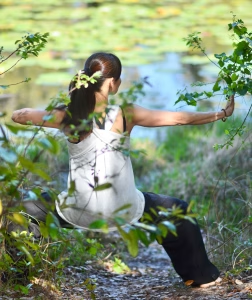
At the end of 2022 I tore my rotator cuff, not throwing a baseball for some important league game, not in some random construction accident nor act of heroism. Instead, one of my first favorite paternal pastimes was throwing my daughter as high as I could into the air then allowing her to crash down on to my palm, elbows flexed, held tight by my bicep’s insertion.
Everyone says the same thing: You blink and they’re all grown up! This isn’t exactly an example of that, but I definitely didn’t take adequate note that my favorite play toy had grown from 15 to 25 pounds, and as an acupuncture colleague who was treating me for the issue remarked: “Would you throw a 25-pound weight up and down and catch it in your palm?”
To which I replied: “It depends how adorable and joyful the weight was.”
Typical presentation of a torn supra-spinatous: Pain radiating into my deltoid, especially with my arm extended to the side and/or behind me—even worse with inward rotation (trying to pour water from pitcher into our filtration system). Occasional pain while lying on my shoulder at night, and I couldn’t throw a tennis ball, let alone a baby anymore. I had to find other ways to enjoy parenthood. I also got used to pouring water with my left arm, which was probably a temporarily decent brain exercise anyway.
My funny acupuncturist friend helped a bit—a lot of sports medicine, trigger points and gua sha techniques—though no classical points, and improvement was always temporary. For two years my intermittent, moderate pain continued, and I was terrified of the notion of surgery and determined as such to avoid it.
I continued to go for treatment, occasionally poked and cupped myself at home as much as I could (though the supraspinatous is located behind the shoulder, making local self-treatment relatively impossible), and got very diligent with my daily Qi Gong practice: Shoulder rotations, shoulder rolls, neck rolls and rotations, “silk reeling” exercises, which are great for creating unique notches of negative space around the joints for the corresponding breathwork’s oxygen to enter. “Qi moves the blood,” is one of our most ancient maxims, which means where oxygen goes, fluids follow. I couldn’t tell you when it happened any more than I could when my daughter jumped from 15 to 25 pounds, but somewhere between years 2 and 3 of my injury, enough fluids got to the tendon and joint for my pain to disappear!
Today I am unsure if the tear is still there—I’m 47, not 27, so my shoulder may never again be perfect. I continue to do my Qi Gong regularly, preventively, not only for my shoulder, but other vulnerable tendons and ligaments as well. Slow and steady heals the shoulder!
If you have chronic pain it is something that requires daily attention, an at home regiment, self-massage and gentle movement anywhere from 10-20 minutes 1-2 times a day, and patience, the “patient patient,” if you will. If you stop, if you half-ass it, or give up, you’ll likely be resigned to the “blue pill,” surgery and well… literal blue pills, either of which will eventually wear off. I often recommend tailored Qi Gong homework exercises to my patients with our sessions, but if you’d like local Qi Gong teacher referrals, please let me know—happy to refer!
What do Gout, Varicose Veins, & Neuropathy Have in Common?
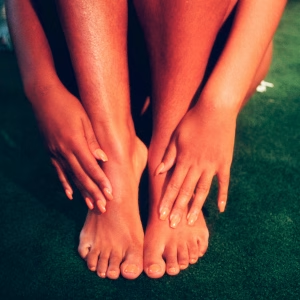
What do neuropathy, gout, and varicose veins have in common? In western medicine not much, aside from being awful inconveniences, ranging from sources of extreme pain to discomfort and/or a significant cosmetic preoccupation.
For neuropathy you go to the neurologist, for gout to the rheumatologist, and for varicose veins you might see your primary care, who will likely refer you to a vein specialist. The neurologist may or may not inquire about venous circulation, and it is very unlikely the rheumatologist will ask about numbness or tingling in your feet.
But from a Chinese medical perspective, all of these conditions fall under the heading of impaired circulation in the lower extremities, caused by either weakness, inflammation, or both, leading to a misdistribution of bodily fluids, which exacerbates the former, which exacerbates the latter, and so on.
They are different in specifics only as a result of individual genetic proclivities—in fundamental mechanism they are the same. Someone with a colder bodily constitution—prone more to hypothyroid or hypotension, will be more susceptible to varicosities, whereas people with warmer body types—prone more to hyperthyroid or hypertension, will be more susceptible to gouty arthritis. The former are well advised to eat plenty of lamb and red meat, while the latter might consider being mostly vegetarian.
Neuropathies can go either way in the way of temperature, as they are more telling of issues with fluid metabolism. We find that neuropathy patients are either unusually thirsty, unusually not thirsty, or they urinate excessively or not enough. In either case, their body is clearly weakened to some degree, and it is imperative they get to sleep by 11pm, so nerves can properly regenerate.
While inadequate urination obviously leads to fluid retention which can clog neurological pathways and impair circulation, excessive urination can dry vessels of their healthy synovial fluids, causing us to feel parts of our body we previously took for granted as being unaware of.
Holistic medicine should modulate the organ function that is causing the improper excretion of fluids in addition to treating local blockages causing pain or discomfort. Easier said than done of course, as such conditions generally took many years to form, plus might be aggravated by present challenges, such as diet, stress, or medications being used to treat other conditions. However, through a course of treatment of acupuncture, herbal medicines, and dietary modifications, one should see improvement over a proper course of treatment, 120 days.
Please be discerning in your choice of clinician. If you see someone—whether east or west—who is failing to assess or treat beyond the immediate site of pain or discomfort, I would highly recommend getting a second opinion.

